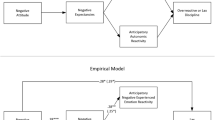Abstract
The interactions of children's behaviors and caretakers' disciplinary practices were studied. Mothers of one- to two-year-old children were trained to report parent-child interactions involving negative emotions. Mothers' observations thus provided data on sequences of child behaviors and parental discipline methods in affective encounters. Mothers' most frequent initial responses to children's misbehaviors were verbal prohibitions. Discipline methods less commonly used were explanations, restraint, instruction, physical punishment, and love withdrawal. Mothers made greater use of this range of control methods following children's noncompliance to discipline. Types of discipline were used differentially following noncompliance, depending upon the form of misbehavior. Children's harms against persons were associated with psychological discipline methods, such as reasoning and dramatization of distress. Destruction of property and lapses in self-control in children were associated with parental power assertive techniques, such as physical punishment and love withdrawal. These associations between child behaviors and parental discipline methods illustrate the interactive roles of child and parent in mediating parental attempts to control, teach, and punish their children.
Similar content being viewed by others
References
Bell RQ: A reinterpretation of the direction of effects in studies of socialization.Psych Review 75:81–95, 1968.
Stevens-Long J: The effect of behavioral context on some aspects of adult disciplinary practice and affect.Child Dev 44:476–484, 1973.
Yarrow MR, Waxler CZ, Scott PM: Child effects on adult behavior.Dev Psych 5:300–311, 1971.
Grusec JE, Kuczynski L: Direction of effect in socialization: A comparison of the parent vs. the child's behavior as determinants of disciplinary techniques.Dev Psych 6:1–9, 1980.
Goodenough, F:Anger in young children. Minneapolis: University of Minnesota Press, 1931.
Clifford, E: Discipline in the home: A controlled observational study of parental practices.J Genetic Psych 96:45–82, 1959.
Box, GEP: Some theorems on quadratic forms applied to the study of analysis of variance problems.Analyses of Mathematical Statistics 25:290–302, 484–498, 1954.
Greenhouse SW, & Geisser S: On methods in the analysis of profile data.Psychometrika 24:95–112, 1959.
Bell, RQ: Parent, child, and reciprocal influences.Am Psychologist 34:821–826, 1979.
Frodi AM, Lamb ME, Leavitt LA, Donovan WL, Neff C & Sherry D: Fathers' and mothers' responses to infant smiles and cries.Infant Behav Dev 1:187–198, 1978.
Lester BM: The organization of crying in the neonate.J Ped Psych 3 (3):122–130, 1978.
Zahn-Waxler C, Radke-Yarrow M, King RA: Child rearing and children's prosocial initiations towards victims of distress.Child Dev 50:319–330, 1979.
Hoffman ML: Moral internalization, parental power, and the nature of parent-child interaction.Dev Psych 11:228–239, 1975.
Hoffman ML: Development of moral thought, feeling, and behavior.Am Psychologist 34 (10):958–966, 1979.
Zahn-Waxler C:The social-emotional development of young children with a manic-depressive parent. Research report made to the Board of Scientific Counsellors, NIMH, Bethesda, Maryland, May 29, 1981.
Zahn-Waxler, C, Radke-Yarrow M: The development of altruism: Alternative research strategies. In Eisenberg-Berg (Ed),The development of prosocial behavior. New York: Academic Press, in press.
Author information
Authors and Affiliations
Additional information
The authors would like to express their appreciation to the following: John Bartko, NIMH statistician, for his advice on statistical analysis; David Barrett, Mark Cummings, and Leon Kuczynski for their constructive comments on an earlier version of the manuscript; Christine Davenport, Arlene Kimata, and Jean Darby Welsh for data reduction and analysis; Eunice Kennelly for preparation of the manuscript; and the 24 children and their mothers who provided observations of the family environment.
Rights and permissions
About this article
Cite this article
Zahn-Waxler, C., Chapman, M. Immediate antecedents of caretakers' methods of discipline. Child Psych Hum Dev 12, 179–192 (1982). https://doi.org/10.1007/BF00706071
Issue Date:
DOI: https://doi.org/10.1007/BF00706071




